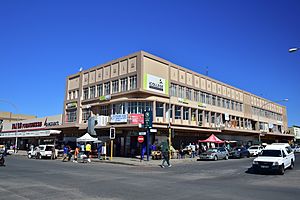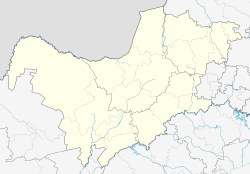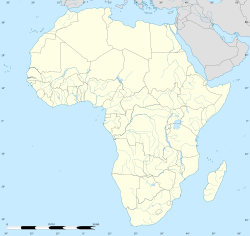Mafikeng facts for kids
Quick facts for kids
Mafikeng
Mafeking
|
|
|---|---|
|
Provincial Capital
|
|
| Mahikeng | |
 |
|
| Country | South Africa |
| Province | North West |
| District | Ngaka Modiri Molema |
| Municipality | Mahikeng |
| Established | 1852 |
| Area | |
| • Total | 24.57 km2 (9.49 sq mi) |
| Elevation | 1,500.0 m (4,921.3 ft) |
| Population
(2011)
|
|
| • Total | 291 527 |
| Racial makeup (2011) | |
| • Black African | 95.5% |
| • Coloured | 2.3% |
| • Indian/Asian | 0.8% |
| • White | 1.3% |
| • Other | 0.8% |
| First languages (2011) | |
| • Tswana | 78.4% |
| • English | 0.6% |
| • Afrikaans | 1.1% |
| • Sesotho | 3.0% |
| • Other | 11.1% |
| Time zone | UTC+2 (SAST) |
| Postal code (street) |
2745
|
| PO box |
2745
|
| Website | www.mahikeng.gov.za |
Mahikeng is a city in South Africa. It is the capital of the North West province. The name Mahikeng means "Place of Rocks" in the Tswana language. It was also known as Mafikeng and Mafeking in the past.
Mahikeng is located near South Africa's border with Botswana. It is about 1400 km (870 mi) northeast of Cape Town. It is also about 260 km (160 mi) west of Johannesburg. The city is built on open grasslands called the veld. It sits at an elevation of 1500 meters (4921 ft). The Upper Molopo River flows nearby. In 2001, about 49,300 people lived here. By 2007, the population grew to about 250,000 people.
Contents
History of Mahikeng
How Mahikeng Was Started
The town of Mahikeng was founded by a leader named Molema Tawana around 1852. He led a group of people called the Barolong to settle along the Molopo River. At first, the town was called "Molema's town."
Later, the main Barolong leader, Montshiwa, felt unsafe because of the Boers nearby. The Boers were Dutch-speaking settlers in the Transvaal. Montshiwa moved his people to another area. But Molema stayed in Mafikeng to make sure the Barolong kept their claim to the land. He was a skilled diplomat and helped prevent the Boers from taking over.
Montshiwa returned to Mafikeng in 1876. Molema believed in education and opened a school for his people. He was also a farmer and a businessman. Molema died in 1882. His son, Silas Molema, became a doctor and a historian. British settlers later spelled the town's name as "Mafeking."
Bechuanaland and British Rule
For most of the 1800s, Mafeking was part of a large area called Bechuanaland. This land was home to many Tswana tribes. Their leaders, called Paramount Chiefs, ruled Bechuanaland. They often got advice from missionaries.
In 1852, the Boers tried to invade Bechuanaland but were defeated. However, 30 years later, in 1882, the Boers successfully invaded. They set up new states called Stellaland and Goshen.
A British missionary, John MacKenzie, told the Tswana chiefs to ask for British help. So, in 1884, the British sent 4000 soldiers. They stopped the Boers and Germans from taking over Bechuanaland.
Bechuanaland then became a British protectorate. This meant it was protected by Britain. Mafeking became its capital. Later, Bechuanaland was divided into two parts. The northern part became the country of Botswana in 1966. The southern part, including Mafikeng, became British Bechuanaland. This area was later joined with the Cape Colony. In 1910, the Cape Colony joined with other areas to form the Union of South Africa.
Even after the division, Mafeking remained the capital of the Bechuanaland Protectorate. It stayed the capital until 1965, when Gaborone was built.
The Siege of Mafeking
A famous event in the town's history is the Siege of Mafeking. This happened during the Second Boer War in 1899. The Boers surrounded the town. The siege lasted for 217 days, from October 1899 to May 1900.
During this time, Robert Baden-Powell led the British defense. He became a national hero because of his actions. After the siege, the British built camps in Mafeking for Boer women and children. In 1904, a monument was put up to remember those who died defending the town. About 212 British soldiers and civilians were killed. The Boers had even more losses.
Changes After Apartheid
Mafeking was the capital of the Bechuanaland Protectorate until 1965. It also briefly served as the capital of Bophuthatswana. This was a self-governing area (called a Bantustan) during the apartheid era. In 1980, Mafeking joined Bophuthatswana and was renamed Mafikeng. It was treated like a part of the nearby city of Mmabatho.
In 1994, apartheid ended in South Africa. Bophuthatswana became part of South Africa again. Mafikeng and Mmabatho merged and became the capital of the new North-West Province. In 2010, the Minister of Arts and Culture, Lulu Xingwana, changed the town's name to Mahikeng. However, many local people still call it Mafikeng.
Important Places in Mahikeng
Mahikeng has several important facilities:
- North-West University
- Mafikeng railway station
- Mmabatho Stadium
- Mafikeng Airport
- Mafikeng Game Reserve (a wildlife area)
- Botsalano Game Reserve (another wildlife area)
Meaning of the Name Mahikeng
The name Mahikeng means "the place of rocks" in the Setswana language. This is the language spoken by people in the North West province and Botswana. The name refers to volcanic rocks. These rocks gave shelter to early humans who hunted animals drinking from the Molopo River.
The city is often pronounced as Mafikeng by the local Batswana people. Historically, it was also known as Mafeking, especially when talking about the Siege of Mafeking during the Boer War. In 2010, the name was officially changed to Mahikeng.
Notable People From Mahikeng
Many talented people come from Mahikeng, including:
- Khuli Chana, an artist
- Presley Chweneyagae, an actor and Oscar award winner
- Vuyo Dabula, an actor
- Katlego Danke, an actress
- Marius Gabriel, a novelist
- Gail Mabalane, an actress and businesswoman
- Bonang Matheba, a media personality and businesswoman
- Fistaz Mixwell, a DJ and music producer
- Mogoeng Mogoeng, a former Chief Justice of South Africa
- Judge Yvonne Mokgoro, a former justice at the Constitutional Court of South Africa
- Keabetswe "KB" Motsilanyane, a singer and actress
- Zenzo Ngqobe, an actor
- Cassper Nyovest, a recording artist and producer
- Hip Hop Pantsula (also known as HHP), an artist
- Rapulana Seiphemo, an actor
- Tuks Senganga, a Motswako musician
Climate
Mahikeng has a warm semi-arid climate. This means it has hot summers and mild, dry winters. The nights in winter can be cool. Mahikeng gets a lot of sunshine throughout the year.
| Climate data for Mafikeng (1991–2020) | |||||||||||||
|---|---|---|---|---|---|---|---|---|---|---|---|---|---|
| Month | Jan | Feb | Mar | Apr | May | Jun | Jul | Aug | Sep | Oct | Nov | Dec | Year |
| Mean daily maximum °C (°F) | 30.6 (87.1) |
30.1 (86.2) |
28.8 (83.8) |
26.0 (78.8) |
23.6 (74.5) |
20.9 (69.6) |
20.7 (69.3) |
23.7 (74.7) |
27.8 (82.0) |
29.8 (85.6) |
30.3 (86.5) |
30.6 (87.1) |
26.9 (80.4) |
| Daily mean °C (°F) | 24.2 (75.6) |
23.8 (74.8) |
22.2 (72.0) |
19.0 (66.2) |
15.7 (60.3) |
12.8 (55.0) |
12.5 (54.5) |
15.3 (59.5) |
19.4 (66.9) |
22.1 (71.8) |
23.1 (73.6) |
23.9 (75.0) |
19.5 (67.1) |
| Mean daily minimum °C (°F) | 17.8 (64.0) |
17.4 (63.3) |
15.6 (60.1) |
12.0 (53.6) |
7.7 (45.9) |
4.5 (40.1) |
4.1 (39.4) |
6.8 (44.2) |
10.9 (51.6) |
14.5 (58.1) |
15.8 (60.4) |
17.2 (63.0) |
12.0 (53.6) |
| Average precipitation mm (inches) | 103.4 (4.07) |
80.5 (3.17) |
62.1 (2.44) |
44.8 (1.76) |
19.0 (0.75) |
5.4 (0.21) |
1.5 (0.06) |
3.2 (0.13) |
8.6 (0.34) |
34.7 (1.37) |
62.9 (2.48) |
92.8 (3.65) |
518.9 (20.43) |
| Average precipitation days | 8.8 | 7.3 | 6.3 | 4.6 | 1.9 | 0.7 | 0.2 | 0.5 | 1.1 | 4.1 | 6.0 | 9.1 | 50.5 |
| Mean monthly sunshine hours | 276.0 | 249.1 | 258.8 | 261.9 | 293.2 | 280.2 | 297.9 | 308.3 | 298.2 | 299.8 | 282.0 | 283.2 | 3,388.7 |
| Source: NOAA | |||||||||||||
Images for kids
See also
 In Spanish: Mahikeng para niños
In Spanish: Mahikeng para niños
 | Roy Wilkins |
 | John Lewis |
 | Linda Carol Brown |





